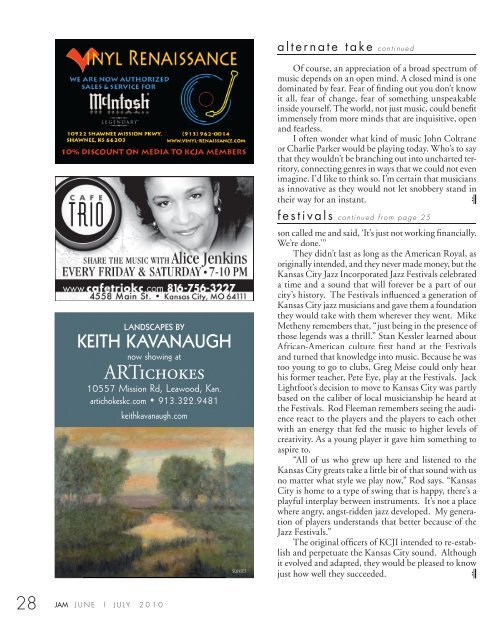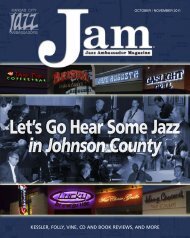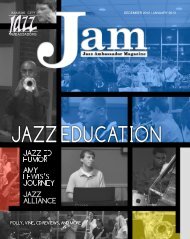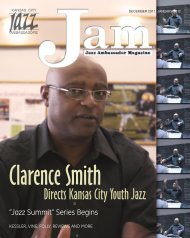June / July 2010 JAM - Kansas City Jazz Ambassadors
June / July 2010 JAM - Kansas City Jazz Ambassadors
June / July 2010 JAM - Kansas City Jazz Ambassadors
You also want an ePaper? Increase the reach of your titles
YUMPU automatically turns print PDFs into web optimized ePapers that Google loves.
28<br />
<strong>JAM</strong> JUNE | JULY <strong>2010</strong><br />
alternate take continued<br />
Of course, an appreciation of a broad spectrum of<br />
music depends on an open mind. A closed mind is one<br />
dominated by fear. Fear of fi nding out you don’t know<br />
it all, fear of change, fear of something unspeakable<br />
inside yourself. The world, not just music, could benefi t<br />
immensely from more minds that are inquisitive, open<br />
and fearless.<br />
I often wonder what kind of music John Coltrane<br />
or Charlie Parker would be playing today. Who’s to say<br />
that they wouldn’t be branching out into uncharted territory,<br />
connecting genres in ways that we could not even<br />
imagine. I’d like to think so. I’m certain that musicians<br />
as innovative as they would not let snobbery stand in<br />
their way for an instant.<br />
festivals continued from page 25<br />
son called me and said, ‘It’s just not working fi nancially.<br />
We’re done.’”<br />
They didn’t last as long as the American Royal, as<br />
originally intended, and they never made money, but the<br />
<strong>Kansas</strong> <strong>City</strong> <strong>Jazz</strong> Incorporated <strong>Jazz</strong> Festivals celebrated<br />
a time and a sound that will forever be a part of our<br />
city’s history. The Festivals infl uenced a generation of<br />
<strong>Kansas</strong> <strong>City</strong> jazz musicians and gave them a foundation<br />
they would take with them wherever they went. Mike<br />
Metheny remembers that, “just being in the presence of<br />
those legends was a thrill.” Stan Kessler learned about<br />
African-American culture fi rst hand at the Festivals<br />
and turned that knowledge into music. Because he was<br />
too young to go to clubs, Greg Meise could only hear<br />
his former teacher, Pete Eye, play at the Festivals. Jack<br />
Lightfoot’s decision to move to <strong>Kansas</strong> <strong>City</strong> was partly<br />
based on the caliber of local musicianship he heard at<br />
the Festivals. Rod Fleeman remembers seeing the audience<br />
react to the players and the players to each other<br />
with an energy that fed the music to higher levels of<br />
creativity. As a young player it gave him something to<br />
aspire to.<br />
“All of us who grew up here and listened to the<br />
<strong>Kansas</strong> <strong>City</strong> greats take a little bit of that sound with us<br />
no matter what style we play now,” Rod says. “<strong>Kansas</strong><br />
<strong>City</strong> is home to a type of swing that is happy, there’s a<br />
playful interplay between instruments. It’s not a place<br />
where angry, angst-ridden jazz developed. My generation<br />
of players understands that better because of the<br />
<strong>Jazz</strong> Festivals.”<br />
The original offi cers of KCJI intended to re-establish<br />
and perpetuate the <strong>Kansas</strong> <strong>City</strong> sound. Although<br />
it evolved and adapted, they would be pleased to know<br />
just how well they succeeded.<br />
Jam_junjul<strong>2010</strong>v3.indd 28 5/18/10 8:37:18 PM





